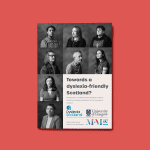Closing Date: 24th Jul 2025
Description
The University of Edinburgh: Are you a neurodivergent adult aged 50 or older? Have you experienced challenges in work, leadership, or career progression due to systems not designed with your needs in mind?
We are currently looking for participants to take part in a research study exploring how older neurodivergent adults navigate employment, leadership, and life transitions. Despite growing awareness of neurodiversity, older adults remain vastly under-researched. This project aims to change that – by centering your experiences and making them visible to policymakers, employers, and advocacy organisations.
What’s Involved: A confidential, in-depth interview focused on your career journey, life transitions, and experiences in work, care, or leadership. You’ll have the opportunity to shape how your story is visualised and shared (anonymously), using accessible tools like timelines, journey maps, and interactive diagrams.
Who Can Take Part? We’re particularly interested in hearing from neurodivergent people (formally diagnosed or self-identifying) including those with: Dyslexia, Dyspraxia, ADHD, Autism or other forms of cognitive/sensory difference You do not need to be in paid work currently – your story matters whether you’re employed, retired, in unpaid care roles, or navigating transitions.
What Do You Get? As a thank you for your time and insight, each participant will receive a voucher for their contribution.
Why This Matters: The findings will be used to:
– Highlight structural barriers neurodivergent adults face later in life Inform employers and policymakers on how to design more inclusive systems
– Create interactive, accessible outputs that bring lived experience to life beyond academic reports.
If you’re interested in participating or want to learn more, please get in touch.
Researcher: Debora Gottardello [email protected]

